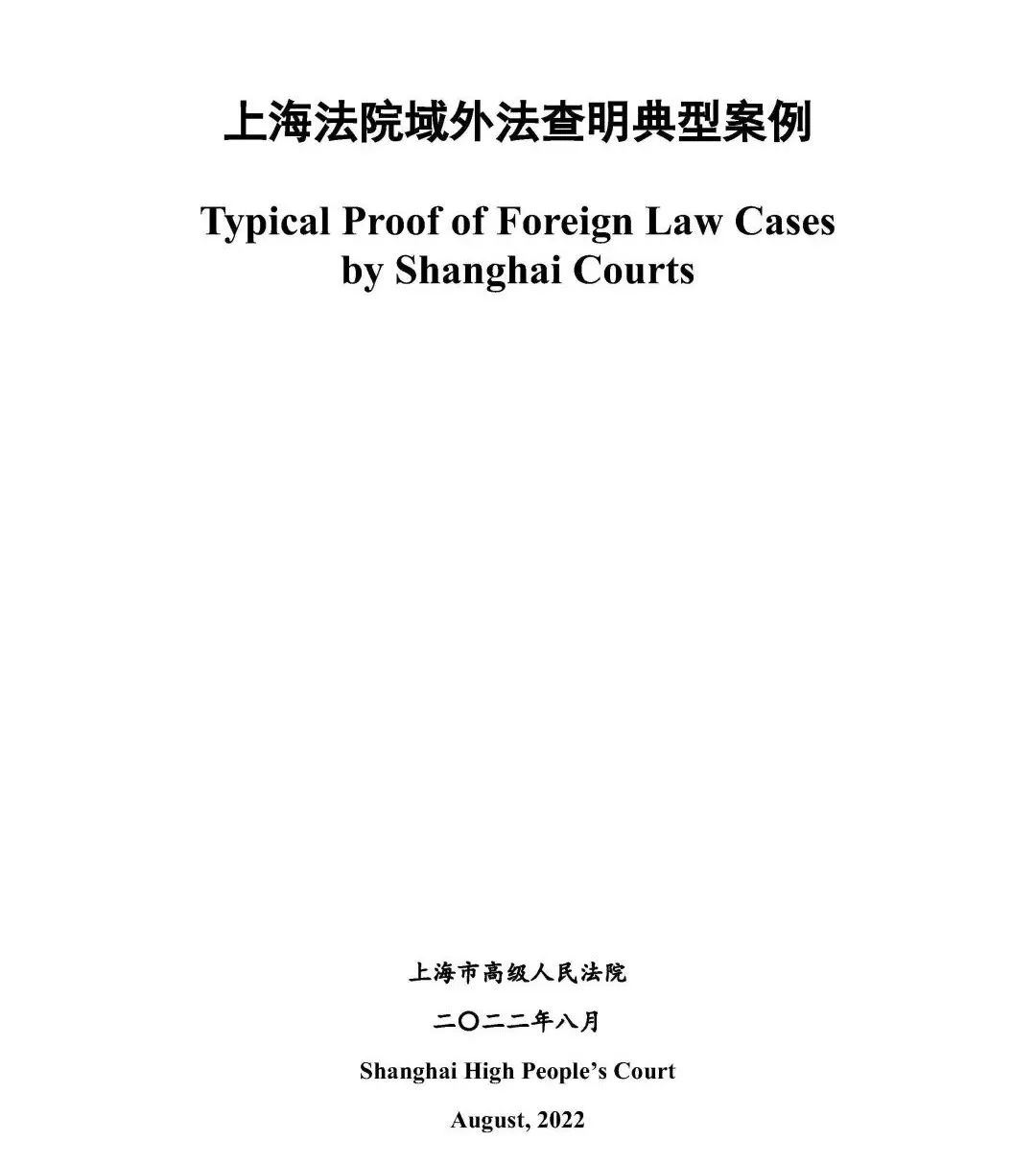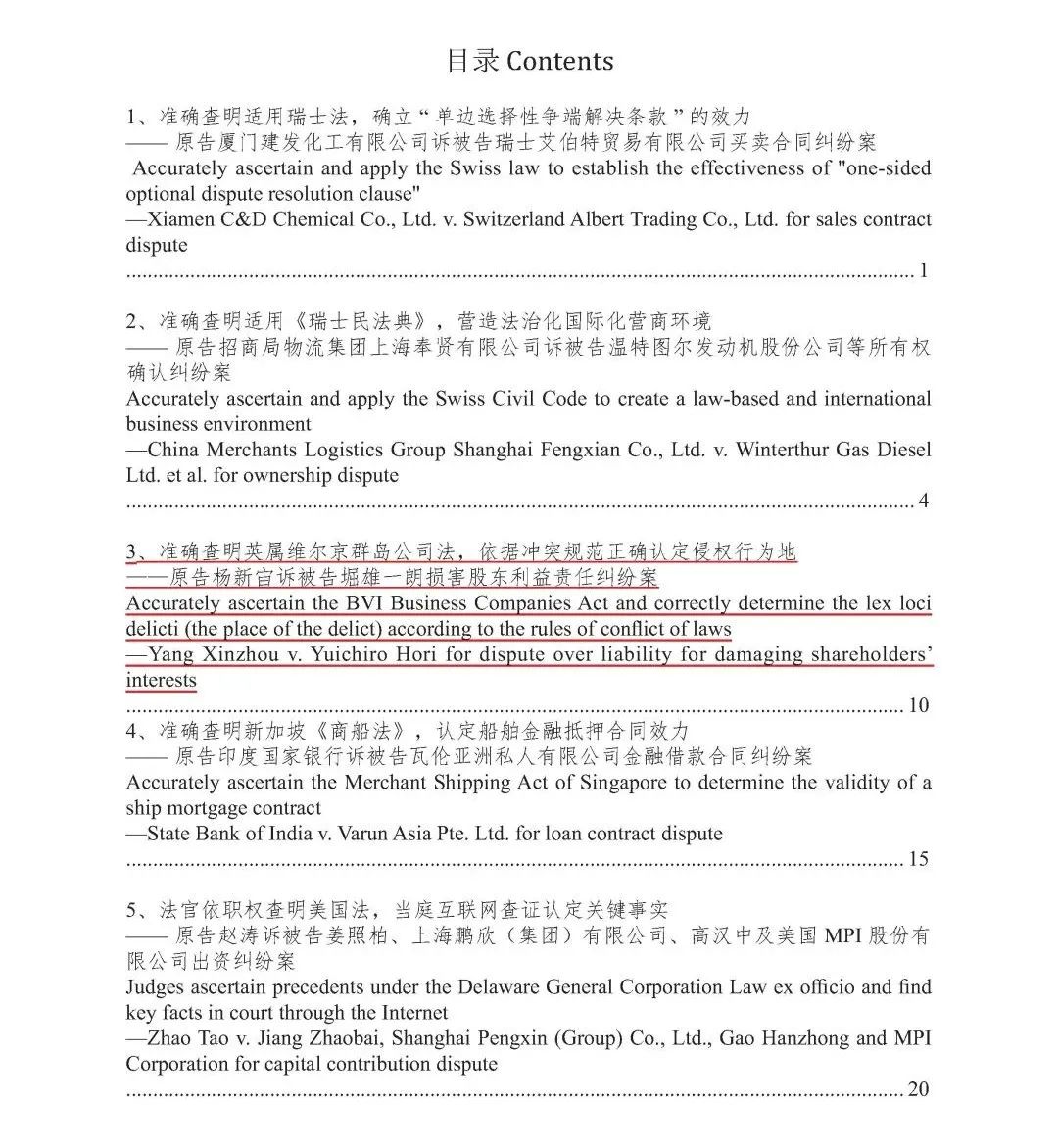近期,上海市高級(jí)人民法院召開(kāi)新聞發(fā)布會(huì),發(fā)布《上海市高級(jí)人民法院涉外、涉港澳臺(tái)商事審判白皮書(shū)(2017-2021)》,并首次發(fā)布《上海涉外商事審判域外法查明白皮書(shū)(2015-2021)》及典型案例。上海高院共發(fā)布了9起域外法查明典型案例,涵蓋近年來(lái)上海涉外、涉港澳臺(tái)商事審判中美國(guó)、新加坡、瑞士、日本、我國(guó)香港特別行政區(qū)、英屬維爾京群島等域外法查明及適用實(shí)踐成果,楊春寶律師、韓惠虓律師代理的原告楊新宙訴被告堀雄一朗損害股東利益責(zé)任糾紛案入選《上海法院域外法查明典型案例》(后附案例全文)。
該案經(jīng)一審、二審,重審一審、二審,再審,歷時(shí)八年多,最終原告楊新宙的訴訟請(qǐng)求獲得全面支持。關(guān)于本案曲折的訴訟過(guò)程以及我們的代理思路詳見(jiàn)《中國(guó)法院首例BVI公司董事?lián)p害股東利益案代理記》,您也可以在B站收看:《經(jīng)過(guò)八年五審,代理上海小股東用BVI法律與日本董事斗法》
在此次發(fā)布會(huì)上,上海高院首次發(fā)布《上海涉外商事審判域外法查明白皮書(shū)(2015-2021)》及典型案例,對(duì)七年間上海法院域外法查明情況及相關(guān)機(jī)制建設(shè)成效等進(jìn)行了梳理。
新聞發(fā)布會(huì)通報(bào),法院在審理涉外、涉港澳臺(tái)商事案件時(shí),如當(dāng)事人協(xié)議選擇某一域外法或根據(jù)沖突法規(guī)范確定適用域外法時(shí),需要通過(guò)一定的方式和途徑來(lái)查明域外法的內(nèi)容。域外法能否查明、是否得到正確適用,直接影響當(dāng)事人的實(shí)體權(quán)利義務(wù)的確定,影響案件的最終裁判結(jié)果。由于域外法情況復(fù)雜、難以準(zhǔn)確理解,因而成為長(zhǎng)期制約涉外、涉港澳臺(tái)商事審判效率的“瓶頸”問(wèn)題。
2015年以來(lái),上海法院涉外、涉港澳臺(tái)商事審判域外法查明案件總體呈現(xiàn)以下五個(gè)特點(diǎn):
一是案由分布廣泛,查明法律趨于精細(xì)化和復(fù)雜化,反映出涉外、涉港澳臺(tái)商事主體對(duì)上海投資、金融、貿(mào)易等領(lǐng)域的全面參與,在涉外、涉港澳臺(tái)商事審判中適用域外法的司法需求不斷增長(zhǎng)。
二是查明途徑拓寬,查明方式體現(xiàn)合作性與多元化,實(shí)踐中既有法官當(dāng)庭利用互聯(lián)網(wǎng)平臺(tái)查詢域外法的方式,也有當(dāng)事人根據(jù)公開(kāi)出版法律學(xué)術(shù)書(shū)籍及本國(guó)已生效裁判文書(shū)等合理途徑提供域外法律的方式。
三是查明主體法定,當(dāng)事人提供與法院查明相結(jié)合,上海法院涉外、涉港澳臺(tái)商事案件域外法查明,按途徑可細(xì)分為當(dāng)事人直接查明、當(dāng)事人委托專家查明、法院委托專家查明和法官直接查明等。
四是查明結(jié)果多樣,成文法和域外判例等均有體現(xiàn),從查明案例抽樣選取的調(diào)研樣本顯示,對(duì)域外成文法查明需求占比68.1%;對(duì)判例查明需求占比25.23%,訟費(fèi)承擔(dān)、仲裁等程序性事項(xiàng)查明占比4.7%;對(duì)國(guó)際條約、國(guó)際慣例的查明,占比1.97%。
五是查明人員專業(yè),專家及服務(wù)機(jī)構(gòu)發(fā)揮重要作用,當(dāng)雙方當(dāng)事人對(duì)域外法理解不一時(shí),法院委托域外法查明專家以專家意見(jiàn)書(shū)的方式,補(bǔ)充查明域外法律,為涉外、涉港澳臺(tái)商事案件準(zhǔn)確適用法律提供有力支持。截至2021年底,華東政法大學(xué)外國(guó)法查明研究中心已接受上海法院委托查明的案例逾20起。
以下為原告楊新宙訴被告堀雄一朗損害股東利益責(zé)任糾紛案案例全文:
三、準(zhǔn)確查明英屬維爾京群島公司法,依據(jù)沖突規(guī)范正確認(rèn)定侵權(quán)行為地 ——原告楊新宙訴被告堀雄一朗損害股東利益責(zé)任糾紛案
III. Accurately ascertain the BVI Business Companies Act and correctly determine the lex loci delicti (the place of the delict) according to the rules of conflict of laws
—Yang Xinzhou v. Yuichiro Hori for dispute over liability for damaging shareholders’ interests
【基本案情】
[Basic Facts]
本案系損害股東利益責(zé)任糾紛。2013 年,Stellarworks Holding Ltd.(以下簡(jiǎn)稱 SW 控股公司)在英屬維爾京群島注冊(cè)成立,股東為堀雄一朗和楊新宙二人, 持股比例分別為 70%和 30%,堀雄一朗被任命為董事。SW 控股公司系 Stellarworks Investment Ltd.(以下簡(jiǎn)稱 SW 投資公司)全資股東,SW 投資公司系富迅國(guó)際貿(mào)易有限公司(以下簡(jiǎn)稱富訊公司)全資股東。2014年3月,Stellarworks International Ltd.(以下簡(jiǎn)稱 SW 國(guó)際公司)在英屬維爾京群島注冊(cè)成立,股東為堀雄一朗,持股比例 100%。SW 控股公司擬將其持有的 SW 投資公司全部股份轉(zhuǎn)讓給 SW 國(guó)際公司,對(duì) SW 投資公司唯一實(shí)質(zhì)性資產(chǎn)即富迅公司資產(chǎn)進(jìn)行了評(píng)估。評(píng)估過(guò)程中堀雄一朗向評(píng)估公司提出了若干建議,后堀雄一朗作為 SW 控股公司的唯一董事批準(zhǔn)了股份轉(zhuǎn)讓協(xié)議。楊新宙認(rèn)為,堀雄一朗作為 SW 控股公司的大股東、唯一董事,在轉(zhuǎn)讓公司資產(chǎn)給自己名下其他公司時(shí),故意壓低評(píng)估價(jià)格,損害了小股東楊新宙的利益,因此主張其賠償損失。
This case is about the dispute over liability for damaging shareholders’ interests. In 2013, Stellarworks Holding Ltd. (SW Holding Company) was incorporated in the British Virgin Islands, with two shareholders: Yuichiro Hori and Yang Xinzhou, each holding 70% and 30% equity. Yuichiro Hori was appointed as the director. SW Holding Company was a wholly-owned shareholder of Stellarworks Investment Ltd. (SW Investment Company), which was a wholly-owned shareholder of Fuxun International Trade Co., Ltd. (Fuxun Company). In March 2014, Stellarworks International Ltd. (SW International Company) was incorporated in the British Virgin Islands, with one shareholder: Yuichiro Hori, holding 100% equity. SW Holding Company intended to transfer all its shares in SW Investment Company to SW International Company, and evaluated the assets of Hong Kong Fuxun Company, the only substantive asset of SW Investment Company. During the evaluation, Yuichiro Hori made several suggestions to the evaluation company. As the sole director of SW Holding Company, Yuichiro Hori then approved the Share Transfer Agreement. Yang Xinzhou believed that Yuichiro Hori, as the majority shareholder and the only director of SW Holding Company, deliberately lowered the evaluation price when transferring the company’s assets to another company under his name, damaging the interests of the minority shareholder Yang Xinzhou, and therefore Yang Xinzhou claimed against Yuichiro Hori for compensation.
【裁判結(jié)果】
[Court Ruling]
上海市閔行區(qū)人民法院認(rèn)為,堀雄一朗系日本國(guó)公民,楊新宙以堀雄一朗在執(zhí)行 SW 控股公司事務(wù)時(shí)侵害其的股東權(quán)益為由主張賠償。本案屬涉外侵權(quán)糾紛, 應(yīng)根據(jù)《中華人民共和國(guó)涉外民事關(guān)系法律適用法》第四十四條的規(guī)定,本案所涉侵權(quán)責(zé)任問(wèn)題應(yīng)適用侵權(quán)行為地法律。因楊新宙所主張侵權(quán)行為為股權(quán)轉(zhuǎn)讓行為,故侵權(quán)行為地為 SW 投資公司的住所地。SW 投資公司住所地位于英屬維爾京群島,故本案應(yīng)適用英屬維爾京群島法律。楊新宙為此提供了《2004 年英屬維爾京群島商業(yè)公司法》法條規(guī)定和律師法律意見(jiàn)書(shū),上海市閔行區(qū)人民法院認(rèn)為,根據(jù)英屬維爾京群島法律,若楊新宙作為 SW 控股公司股東的權(quán)利受到堀雄一朗執(zhí)行 SW 控股公司事務(wù)時(shí)的不公平行為損害,則楊新宙有權(quán)向堀雄一朗主張賠償。
Minhang District Primary People's Court of Shanghai Municipality found that Yuichiro Hori was a citizen of Japan, and Yang Xinzhou claimed compensation against Yuichiro Hori on the grounds that Yuichiro Hori infringed upon Yang Xinzhou’s shareholders’ rights in the execution of SW Holding Company’s affairs. This case is a foreign-related infringement dispute, which should be governed by the law determined by Article 44 of the Law of the People's Republic of China on the Application of Law on Foreign-related Civil Relations. The liabilities for delict in this case should be governed by the lex loci delicti commissi, i.e., the law of the place where the delict was committed. Given the delict claimed by Yang Xinzhou was an equity transfer, the place where the equity was located, i.e., the place where SW Investment Company was domiciled, shall be the place where the direct result of the delict occurred. Therefore, the place of delict shall be the domicile of SW Investment Company, i.e., the British Virgin Islands; the law of the British Virgin Islands shall apply to this case. Considering the provisions of the ascertained law and the lawyer’s legal opinions, the Minhang District Primary People's Court of Shanghai Municipality held that according to the laws of the British Virgin Islands, if Yang Xinzhou’s rights as a shareholder of the SW Holding Company were damaged due to the unfair execution of the SW Holding Company’s affairs by Yuichiro Hori, Yang Xinzhou had the right to claim against Yuichiro Hori.
堀雄一朗提起上訴,要求適用雙方共同經(jīng)常居所地即中華人民共和國(guó)法律。
Yuichiro Hori filed an appeal, requesting the law of the People’s Republic of China, i.e., the common habitual residence of both parties, be applied in this case.
上海市第一中級(jí)人民法院認(rèn)為,堀雄一朗提供的外國(guó)人就業(yè)證等證據(jù)不足以證明其經(jīng)常居所地在中華人民共和國(guó)境內(nèi),案件管轄權(quán)認(rèn)定中的“住所地”概念與前述法律規(guī)定中的“經(jīng)常居所地”并非同一概念,因此上海市閔行區(qū)人民法院適用侵權(quán)行為地即英屬維爾京群島法律并無(wú)不當(dāng)。
The Shanghai First Intermediate People's Court held that, such evidence as foreigner work permit provided by Yuichiro Hori was insufficient to prove that his habitual residence was within the territory of the People’s Republic of China. The concept of "place of domicile" in the determination of case jurisdiction is not the same as that of "place of habitual residence" in the above-mentioned legal provisions. Therefore, it is not improper for the court of first instance to apply the lex loci delicti commissi, i.e., the law of the British Virgin Islands.
【典型意義】
[Typical Significance]
本案涉及公司類侵權(quán)案件的法律適用問(wèn)題,侵權(quán)行為發(fā)生在英屬維爾京群島,但根據(jù)侵權(quán)案件法律適用的有關(guān)規(guī)定,當(dāng)事人有共同經(jīng)常居所地的,適用共同經(jīng)常居所地法律。本案爭(zhēng)議焦點(diǎn)之一即是雙方是否均以上海為共同經(jīng)常居所地,本案應(yīng)適用英屬維爾京群島法律還是我國(guó)法律。堀雄一朗提供了其在上海有房產(chǎn)、 工作等證據(jù),但出入境記錄顯示其在涉案行為發(fā)生期間頻繁往來(lái)于日本和上海, 因此法院認(rèn)定其證據(jù)不足以證明其經(jīng)常居所地在上海。法院最終根據(jù)英屬維爾京群島官方網(wǎng)站上的法律條文、楊新宙提交的翻譯件、楊新宙委托的當(dāng)?shù)芈蓭煶鼍叩姆梢庖?jiàn)書(shū)查明了英屬維爾京群島相關(guān)法律,作出了判決。本案對(duì)同類案件的法律適用、侵權(quán)行為認(rèn)定具有典型示范意義。
This case concerns the application of law for company-related delict. The delict occurred in the British Virgin Islands. However, according to the relevant provisions on the application of law in delict cases, if the parties concerned have a common habitual residence, the law of common habitual residence shall apply. One of the disputed issues in this case is whether both parties take Shanghai as their common habitual residence? Should the law of the British Virgin Islands or the law of China be applied in this case? Yuichiro Hori provided evidence that he had real estate and worked in Shanghai, but the entry-exit records showed that he frequently traveled between Japan and Shanghai during the occurrence of the delict. Therefore, the court found that his evidence was insufficient to prove that his habitual residence was Shanghai. The court finally ascertained the relevant laws of the British Virgin Islands and rendered a judgment according to the legal provisions on the official website of the British Virgin Islands, the translation submitted by Yang Xinzhou and the legal opinion issued by the local lawyer entrusted by Yang Xinzhou. This case is of great reference value for the application of law and the finding of delict in similar cases.






